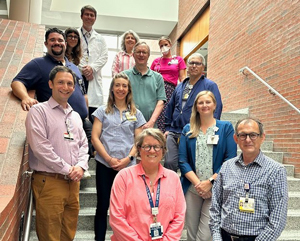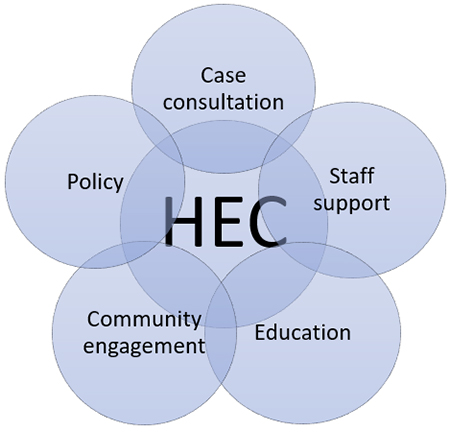Ethics Committee
Mission Statement

Our mission at the Clinical Ethics Program is to foster a culture of ethical excellence and compassionate care through education, policy development, and consultation. We are committed to:
- Ethics Education: Providing comprehensive education and training to healthcare professionals, students, patients, and families to enhance their understanding of ethical principles, dilemmas, and decision-making processes in healthcare.
- Policy Development and Review: Developing and regularly reviewing policies that uphold the highest standards of ethical practice, ensuring alignment with institutional values, and emerging ethical considerations in healthcare.
- Ethics Consultation Services: Offering timely, expert, and compassionate ethics consultations to patients, families, and healthcare teams facing complex ethical challenges. Our consultations are guided by a commitment to the biopsychosocial approach to health care.
- Advocacy and Support: Advocating for vulnerable populations, promoting patient-centered care, and supporting healthcare professionals in navigating ethically challenging situations with integrity and sensitivity.
- Research and Scholarship: Advancing the field of clinical ethics through scholarly inquiry, research initiatives, and collaboration with interdisciplinary teams to address emerging ethical issues in healthcare.
- Community Engagement: Engaging with the broader community through outreach programs, public forums, and partnerships to promote ethical awareness and dialogue on healthcare issues that impact our society.
Through these core responsibilities, we strive to uphold the highest ethical standards in clinical practice, contribute to the academic mission of our medical center, and ultimately, improve the quality of care and well-being of our patients and their families.
The Biopsychosocial Model
In 1984, the University of Rochester was among the first medical schools to create a Division of Medical Humanities. A natural outgrowth of the school’s signature biopsychosocial model, the Department of Health Humanities & Bioethics houses the Program for Clinical Ethics and the SMH ethics committee. The BPS focuses on the personal, the social, and the cultural aspects of health care and provides the guiding framework for the HEC. This requires knowledge of medicine, biology, illness; skills necessary to understand personal, spiritual, religious, community, and cultural values that influence healthcare decisions; skills necessary to critically analyze the salient features of ethical cases, apply knowledge to patient care, and evaluate various ethical recommendations; and the dispositions necessary for nonjudgmental regard. The work of the HEC includes addressing broader ethical issues that affect the health of the community and ultimately, the individual.
Membership on the Hospital Ethics Committee
The Ethics Committee is an active interdisciplinary group that includes broad representation from the clinical and educational enterprise, including physicians, nurses, social workers, chaplains, philosophers, residents, students, therapists, lawyers, administrators, and others. Importantly, representatives from the Rochester Community are vital members.
HEC members are selected to serve one, two, or three year terms. Membership requires active participate in HEC events, work groups, and community activities, connecting the work of the HEC to clinical care, education, and the greater Rochester community.
The HEC welcomes participation in its ethics related activities and encourages anyone interested in learning how to contribute to contact any current member of the committee or any current member of any working group. Current members, the Chair of the Ethics Committee, or the CMO may recommend new HEC members.
The Chief Medical Officer of SMH must approve the Ethics Committee roster and may appoint members as necessary.
Hospital Ethics Committee Functions
 Activities of the HEC and its five working groups promote a URMC environment of ethical excellence, respect for all, and the development of a diverse community of thinkers.
Activities of the HEC and its five working groups promote a URMC environment of ethical excellence, respect for all, and the development of a diverse community of thinkers.
- Clinical Consultation
- Act as an interdisciplinary forum to address ethical conflicts encountered within the UR Medical Center.
- Assist with and review cases seen by the Clinical Ethics Consult Service.
- Solicit community engagement about contextual information around ethical issues.
- Policy
- Review, update, and develop hospital policies with ethical implications.
- Develop and share position statements on relevant ethical issues.
- Bioethics education
- Promote and develop ethics education activities for the HEC, UR Medicine employees, and the greater Rochester community.
- Staff support around moral distress
- Counsel and support health care providers and staff who are troubled by situations that contribute to moral distress.
- Community Engagement
- Partner with community members to support community initiatives around bioethics.
Core Ethical Principles
The four principles of bioethics are
- beneficence – promote the best interest of the patient,
- non-maleficence – avoid or minimize harm,
- autonomy – respect for an individual’s right of self-determination, and
- justice – fair treatment of individuals and fair decision-making processes.
In addition to the four principles of bioethics, individuals and healthcare professions recognize principles of 1) fidelity – the primacy and necessity of trust, 2) veracity – the necessity for truthfulness, 3) confidentiality – the obligation to hold the confidence of patient information, and others are critical to the creation and maintenance of therapeutic relationship.